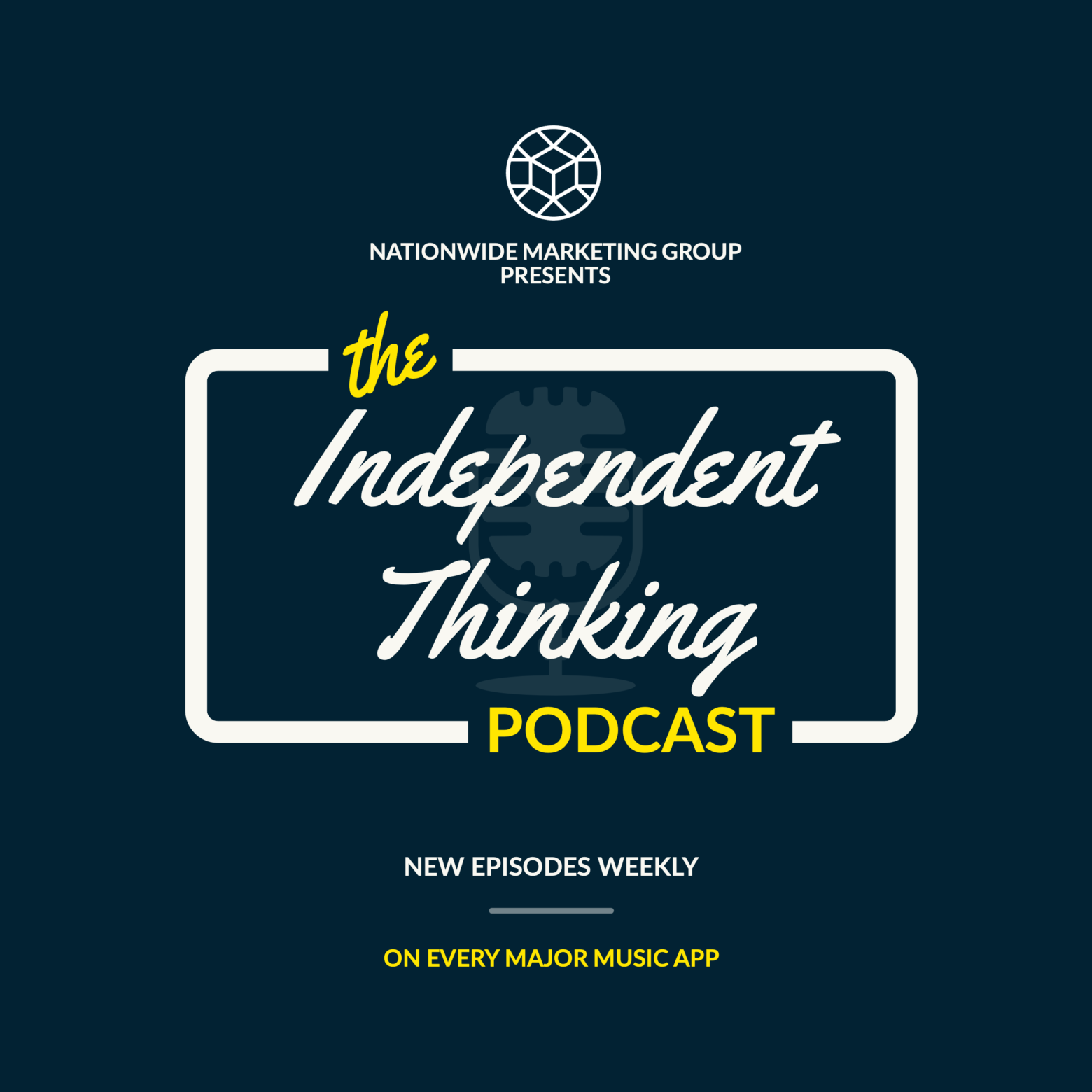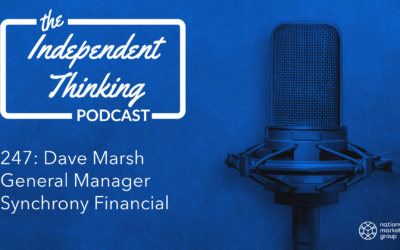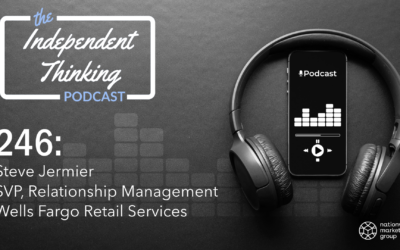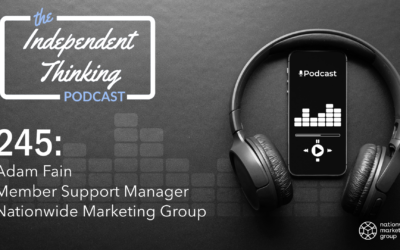Chris Carey, CEO of Tech Smart USA, talks about the services his company offers and the opportunity the independent retail channel has in helping customers overcome the challenges in the connected home category.
Rob Stott: All right. We’re back on the Independent Thinking Podcast live from PrimeTime in Houston. And right now sitting here with Chris Carey, CEO at Tech Smart USA. Chris, appreciate you. You’re only a couple steps away, so I didn’t drag you too far.
Chris Carey: I am a couple of steps, yes. Thank you for having but I’m the neighbor. So yes.
Rob Stott: Yeah, but I appreciate you stepping away for a little bit and chatting with us and joining us on the podcast.
Chris Carey: And thanks for having us.
Rob Stott: So we’ve talked a bunch with some of the Nationwide team this week about, and with the members as well about, Tech Smart in a new partnership with Nationwide. So before we dive into the partnership, tell us a little bit about your company and the history of it and how you guys got to where you are today.
Chris Carey: Absolutely. So the genesis of our company really is software services and accessories and 3PL. And we do that for a lot of the TV shopping networks right now. And that’s really where some of our connections came from. Software is something that can add value. Accessories like our hard shells, and our laptop, and wave stands are great things to add value to devices. And of course tech support. And that’s really why we’re here is to help out users in the connected home space to become familiar with devices, and make sure there are no issues, keep the returns at bay, and make sure that the dealers have no issues getting them out to the users.
Rob Stott: And it’s that last point that you hit on that I know has at least one Nationwide person here, one exec, Derek Mattila, pretty fired up. So this tech support side of things. And Derek for those who don’t know him is the VP of the Connected Home division here at Nationwide. And this connected home space has really done a lot, especially for independent retail. I would say the retail channel in general. But independent retailers, it offered them an opportunity to continue that relationship with the customer after the fact, after the sale. And what’s it that you guys do in that space as far as the tech support side, and what does that actually look like as a service from you guys?
Chris Carey: Yeah. So we’re there to make sure that the end-user at the end of the day is happy with their purchase. Connected home is really a whole bunch of different devices that need to all work together. And it starts with your Google Home, or your smart lights, or whatever that is. And they all have to talk to each other one way or another. And so we interface directly with the end-user to make sure that scenario works as well as possible for them. And we also do the tech support for the computer and the Android or iOS device in the home as well too, because everything’s all part of that ecosystem. Right?
Rob Stott: Right, right.
Chris Carey: And if you’re a home user, you may not be familiar with all those things. And even if you’re a reseller, there is a little bit larger burden to learn everything that is in there. So that’s where we’re out to help out with that and try to make that easier. Yeah.
Rob Stott: And there’s that brand-agnostic aspect of this, right? Because the connected home has… If you wanted to be a one brand type of person, the connected home is really not the space for you.
Chris Carey: No, no.
Rob Stott: It’s impossible to try to stick to that one brand. There are so many options out there. That’s not a hurdle for you guys.
Chris Carey: It’s not a hurdle. We’re familiar with just about every platform that’s out there. And every day there’s some new flavor or something being released, and it’s being released at the billion-dollar, probably in the months. Every month, it’s a billion-dollar opportunity out there to grow that space.
Rob Stott: That’s unbelievable. So the retailer for Nationwide that is interested in something like this, what’s the pitch to them? How are you presenting this to them as something that they need to think about if they aren’t already?
Chris Carey: Well the main pitch to them is if they’re having problems getting the margin story of their connected home area tweaked, adding a $36 three year tech support with over $199 retail value can really help you hit your margin category. And if you want to try and help out the consumer, add value at the same time, and make it a nice story for your device that nobody else has, that nobody else can shop. You can’t go down to your local big-box retailer and find this associated with another device. Right? So you are unshoppable, you add retail value, you take a lot of the risk and a lot of the pain out of your selling situation.
Rob Stott: So then turn it around a little bit. That’s the pitch to the members that are here engaging with you at PrimeTime. So what’s their pitch then? How do they pitch it to the consumer? Is this something that they would then pitch to the consumer?
Chris Carey: Oh yeah, absolutely. Because this is a really a big fear touchpoint for people in the smart home space. People don’t know how to get all these things integrated. And it is a little bit more difficult because there’s not a GUI for every single thing that’s out there. So touching it, feeling it-
Rob Stott: Explain that for a second. So this is a new space to a lot of people, right?
Chris Carey: Right.
Rob Stott: So sitting here, I have that CE background. People are thinking, “Gooey, what is this, stickiness, or some kind of sticky material.” What’s a GUI?
Chris Carey: So a GUI is a user interface, buttons to touch. If you look at your smart home devices, typically it was maybe one button, right, or two. And so you have to set those up through your smartphone, through apps, through your PC, through whatever other devices you have to do that with. And to not be able to touch it, feel it, and be able to set it up as easy as that. Right? And then he had to connect all those devices. There’s a fear component to it. But every household in the United States right now wants to be able to say, “Hey Google, turn on my lights.” They want-
Rob Stott: Careful. We’re in a trade show. You might activate something.
Chris Carey: I know. We might just activate a lot of things here, yes. But everybody wants that. And what they do is they usually set it up in their living room and then they go, “Wow, now I need this in my bedroom. I want this in my bathroom. I want this in the rest of my home. I want my lights to turn on when I come in the driveway. And I want to make sure that my family has all these convenience items for the home.” And so it starts there. People are spending lots of money. And the great thing about it is they’re coming back to the real retailers over and over again because once they get it there, they’re good. And it’s going to be about growing the rooms in the house for that connected home environment.
Rob Stott: Right, right. And something that is interesting in… We’ve talked about a little bit here this week with Derek and a couple of the other guys is that from the tech support side of things, there’s a huge opportunity that’s being presented right now in particular. This year, 2020, has been pegged for a long time now as the year that something like 5G is going to become available. And that is something, the first thing that comes to mind sitting here with a smartphone. Yeah. That’s the big side of things. But also in-home is going to be another side where this has an impact. Wifi routers are going to have to be upgraded. So you talk about being able to take advantage of an opportunity with a program right away. Are you ready for the amount of calls your team might be getting here for tech support with what’s to come with 5G?
Chris Carey: Right. Yeah, absolutely. We’re very, very scalable and we’re based in the United States. We’re in Michigan, we can touch it, feel it. We can hire people on as that goes. But really we’re already staffed up for our TV shopping networks, which are really fourth quarter type of situations. Right?
Rob Stott: Yeah, Yup.
Chris Carey: And so when you get into first, second, third quarter, we’ve got the bandwidth to do pretty much anything. And on top of that, you hit the nail on the head, with all those devices being changed out, all those wifi passwords that have to be tweaked and-
Rob Stott: Right. It’s not just the routers. I think we were talking the number’s something like 20-some devices by the end of this year on average in a home or connected to a router. So think about all those passwords you absolutely forgot. You’re going to have to reconfigure them on a new router, type in the password, email, username, all that sort of stuff. It sounds like a nightmare. I’m scared for it.
Chris Carey: It is. It’s a lot of work and it’s a lot of time, too, to get it… Because if you’re not familiar with all the back-ends and how they set all those things up, right, you’re going to just drag yourself through that, and you have to Google your way through it and try to figure out what that is. And that means that the resellers are going to have to do that too. And so that’s where Derek’s dream is, is really to make sure that reseller doesn’t get burdened by that. Everybody’s going to have this, right? There’s no way you can avoid this connected space. So if we’re going to do it, let’s do it really, really well. Be ahead of the curve. And then on top of that, let’s make some money, right? And then let’s make the consumer experience the very best it can be at the end of the day.
Rob Stott: You kind of mentioned it, in that this is a… When you were talking about scale, just how you guys are ready. For someone that might have fear about calling a service like this and getting connected with someone that they aren’t confident… Just off the bat, you think of other call services and things like that. Just confidence level might start out low. So what’s done at Tech Smart USA? How are you guys working with those expert technicians and making sure that they’re up to snuff? And what’s that process like to make sure they are able to be a Tech Smart USA expert technician?
Chris Carey: Yeah. Well, that’s really where our sweet spot is. It starts with personality, right? You have to have a personality to want to talk to people. If customer service… because there’s a lot of customer service areas that people just don’t want to do it. Right? Or they’re in another country or whatever and then you get… Or they’re not set up to actually want to take care of people’s issues. Our team is handpicked from those people who really want to help. They are enthusiasts in everything that they touch and do. When I say, “Hey, we’re going to bring in smart refrigerators,” people’s eyes light up and they’re excited. Right?
Rob Stott: That’s awesome.
Chris Carey: They want to touch the new and latest technology and they want to help.
Rob Stott: You guys are getting hands-on experience with this stuff.
Chris Carey: Right. So they’re touching it every single day and they love it, right? And so it really comes from passion, being able to help out users, and really be ahead of the curve and help people out. And then of course on the other side of it, we have to be educated. Right? So there’s a constant training that we’re going through looking at new devices. We’re going to trade shows all the time. We’re going and we’re testing each one of the technicians to make sure that they know what they’re talking about. And then we make sure that the ratings for each one of the technicians are really, really high. And there are times when a technician will have a birthday or whatever, they’ll get birthday gifts delivered to our office space. I don’t. Nobody does that for me. But they are so well-loved and they have such great relationships.
Rob Stott: Tech Smart, you would say, “Staff, if you’re listening…”
Chris Carey: Yes, yes. Those guys over there, they are treated really, really well.
Rob Stott: No, that’s awesome.
Chris Carey: So they love what they do and that’s really the secret to the success.
Rob Stott: So what’s innovation for a company like Tech Smart? What are you doing to keep yourself fresh and future-proof in a sense?
Chris Carey: Well, we have a lot of different aspects for our company and we’ve mentioned the wave stand, which is that bendable stand type thing. I’m a serial entrepreneur. I would not be able to sit back and just say, “Well, let’s just do tech support.” Right? We want to explore technologies much because we are enthusiasts about what we do. Taking something like a wave stand or an iPad case and offering that to users. The other thing that we do is we license software and we create software. So we want to be on the cutting edge and say, “Okay. Well, your computer is running slow right now because you have malware. Hey, let’s build the best malware program we can build. Or let’s go license software and actually include that with the devices.”
So it is a constant challenge, and really getting back to it, software service, accessories, and 3PL. Making sure that there’s a value story and something new you can do with your device. Right? Why buy it if there’s nothing you can do that’s new? You know?
Rob Stott: Right. Absolutely.
Chris Carey: Adding accessories that you’ve never seen before, why would you want to go get the same case? We’ve shown off some of the different cases we have here and the mouths drop every time they see them. Right? You’re like, “Wow. You’re doing that. That’s amazing.” Right? This little company in Michigan.
Rob Stott: That’s pretty cool. And you’re here at PrimeTime. First PrimeTime?
Chris Carey: First PrimeTime, yeah.
Rob Stott: First PrimeTime. What’s it been like for you? And more importantly maybe, what type of feedback have you heard from the members that have come by and interacted with you and engaged with you here?
Chris Carey: Well, I can’t say anything bad at all about this experience. This has been a great experience for us. There’s a lot of people that we know here already. Right? So it’s hanging out with your best friends and they just happen to be your business partners and friends, that sort of thing. So for us, there was a low bar to get over. It is a different experience from what a CES booth would be or when you go to other shows because the people that are here are more interested in making money and in really fostering those relationships. And so shame on me for not being here sooner, but we’re very blessed to be here.
Rob Stott: No, that’s awesome. And Chris, I appreciate you taking a few minutes and stepping away and chatting with us, and awesome to learn about you guys. Like I said, it’s one of the services, not only Derek but myself, seeing how this connected home space for Nationwide has come together. And then they had everything from the introduction into the research process of buying through to getting the products and helping members get the right product mix to now with Tech Smart USA, there’s this after-sale way to continue that relationship with the customer. And that’s something I know we’re all jazzed about. So it’s neat to get to know you guys and I look forward to seeing you at future shows.
Chris Carey: We’ll be there.
Rob Stott: Appreciate it.
Chris Carey: So thanks for having us.




